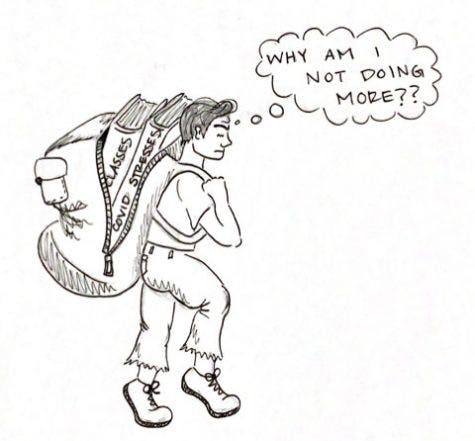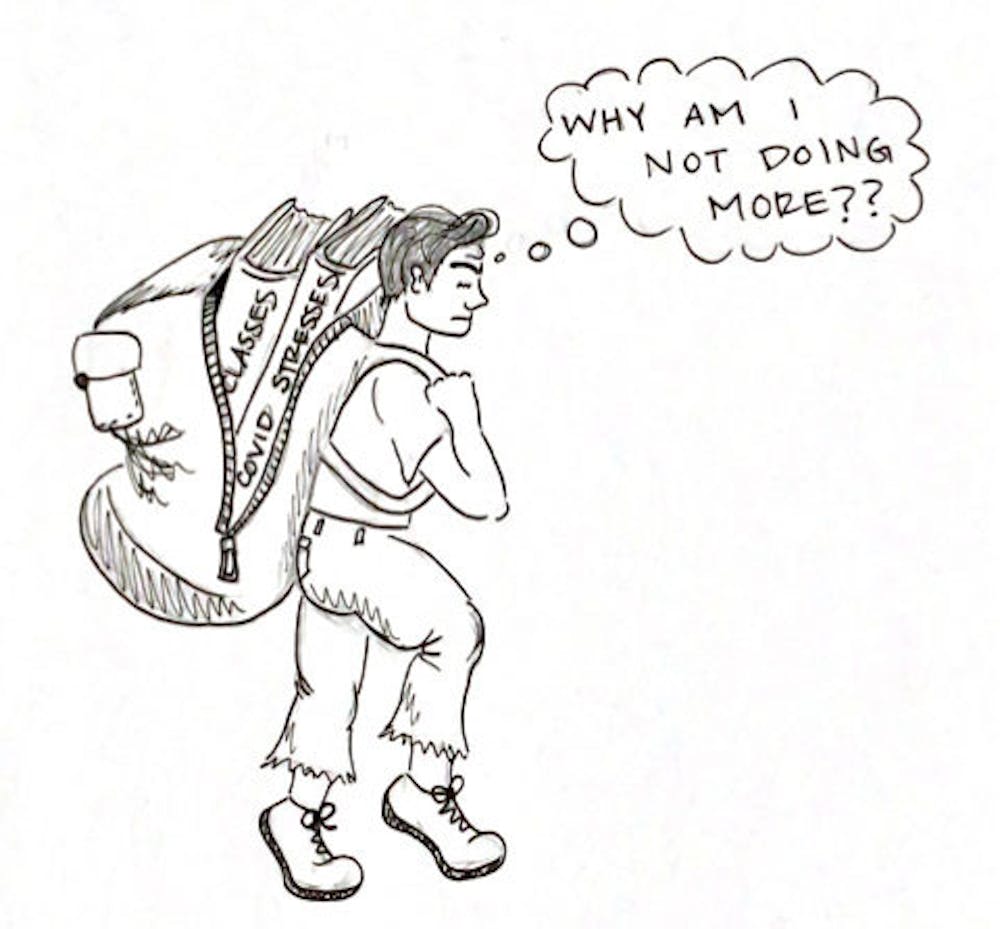We’ve felt it too. The pressure, late nights and stress of this semester are more intense and taxing than usual. Of course, some of this can be chalked up to the global and national conditions of our present moment. Attending college during a pandemic and a moment of national unrest was always going to be difficult. Yet one Middlebury-made stresser adds yet another layer: our busyness culture.
During any given semester, college students all around the country pressure themselves to fill their time — to be perpetually busy — in order to get the most out of their undergraduate experience. But at Middlebury, this practice has elevated into an artform. Braggadocio of late-night studying, volume-shooting internship applications and long lists of clubs joined serve as battle scars of a productive semester.
Somehow, the pandemic has elevated these self-inflicted pressures. Now, without social outlets like weekend parties, days off or even just going to a friend’s room to break up the grind of the semester, many students are throwing themselves into work just to fill the time. The institutional and cultural pressure of internships and jobs are yet another stressor to deal with, adding more work to students’ already burdened plates.

Without open access to public study spaces, students are confined to their rooms, further blending the boundaries between study and relaxation. To make matters worse, while most professors are leading with grace and flexibility, some seem far too eager to burden students with large courseloads and unforgiving deadlines in an attempt to preserve the rigor of a Middlebury education. The sum of these parts is an overworked and under-rested student body. At Middlebury, the grind doesn’t stop; it just adapts. The nightmarish question of “was your pandemic productive?” looms over all students, even those taking the semester off.
These pressures were compounded last week with the college’s announcement of a remote J-Term and late start to the second semester. Faced with an empty three months to fill on short notice, many students are struggling to imagine how — or where — they’ll spend their winter. Only three weeks away from the decision deadline, many are scrambling to make plans.
For many students, the busyness stresses of the current semester are relatively “normal”: classes, internships and academic work. For some, leaving campus for an extended period of time means that these stresses will be replaced with the far more terrifying reality of the pandemic and the material health risks it brings. Students with proximity to frontline workers — or are frontline workers themselves — or to those with vulnerabilities must deal with much more serious questions than whether or not their professor will round up an 89. Conversely, others will retreat to comfort, far away from the most devastating realities of the pandemic, and be free to fret over the snowfall on the ski slopes. Without the equalizing force of campus, Middlebury students are headed for vastly different experiences, further heightening the student body’s class divisions.
But the common thread that connects us all is busyness, in all of its forms. Everyone wants to make their time away from campus worthwhile, but that word has a different meaning for each student. There is a pressure from both Middlebury the institution and Middlebury the culture to perform — and to perform well.
Yet we, the students, create that culture that we consume. There is an exit from this, and it begins with all of us appreciating the circumstances under which we find ourselves. Kindness to ourselves and others — however cliché — must be a motivating force for all of us as we finish out the term and navigate the winter. The grind of internship applications and busywork will not be what gets us through this pandemic. Thoughtful reconsideration of our own goals this semester is needed in order to create an environment that works for all.
This should also be a moment of self-reflection. Each of us should focus on prioritizing our own mental health and filling our days with what we value — not what others tell us is valuable. Moving away from busyness culture as a community requires figuring out what’s right for each of us and supporting that in one another. [pullquote speaker="" photo="" align="center" background="on" border="all" shadow="on"]It’s okay to be busy, but not for the sake of being busy.[/pullquote]
What makes Middlebury, and an on-campus experience, special is the people. Peers, staff and professors are why students came back to campus. Let’s not lose sight of that in the deluge of work that currently lays in front of us. Our social outlets may look different, but we should make time to maintain and cultivate connections and take care of ourselves. The community displayed during this past Spring’s evacuation was a fleeting glimpse of a better Middlebury — we have to make it permanent.
This editorial represents the opinions of the Middlebury Campus’s editorial board.




